Perhaps no other set of events in recorded history have been as analyzed or discussed more thoroughly than those that transpired during the Second World War. Scholars and historians have poured over the volumes of accounts written on this pivotal moment in time in an attempt to gain insight and understanding into what transpired during this momentous period in human history.
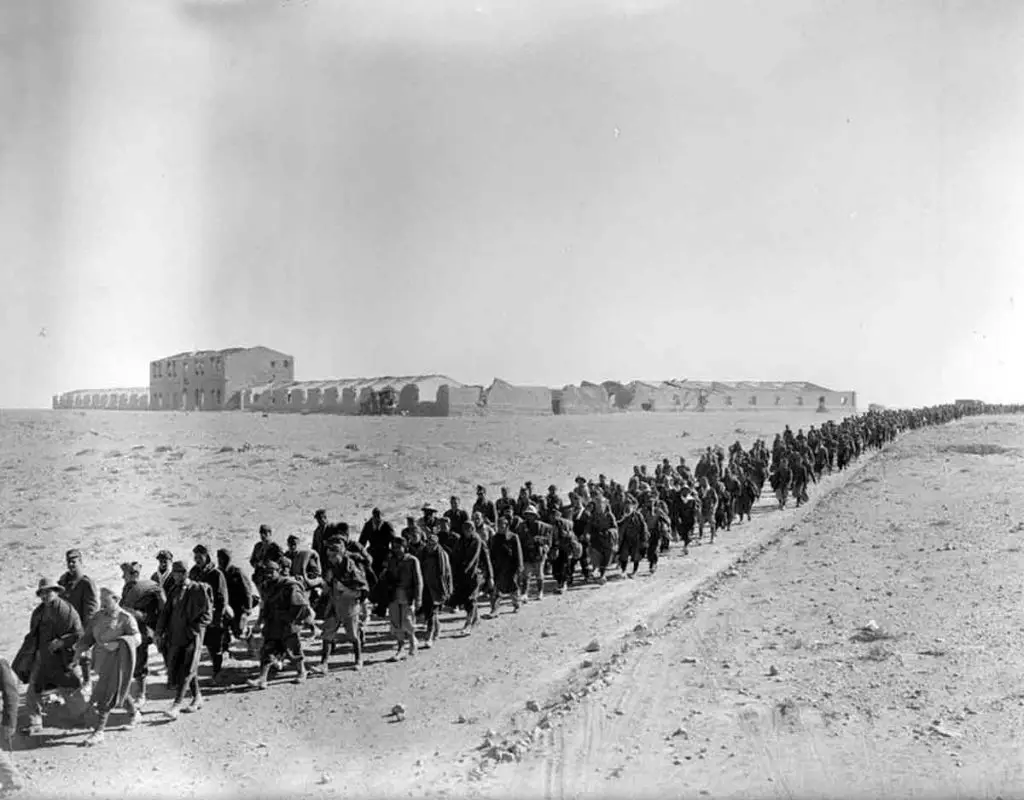
Italian prisoners captured at Sidi Barrani.
A common theme for writers and researchers that put pen to paper to define the Italian military of 1940 has been its total unpreparedness for war.
“The human cost of this war is incalculable. I can not understand how, after so much organizational effort, we are still to this: to rely solely on the “poor man” ( the private). And the poor man endures well, with superb moral energy. But, but …. If anyone of you hears dubious judgments about the privates, from here we urge you to attack these detractors and bite them to the death! There will be many military trials to do, after, but not even one for the common soldier.”
Since the war’s final shots and the world eased into the ‘Cold War,’ military historians have chronicled the shortcomings of the Italian armed forces. Specifically, the perceived poor results it obtained during the conflict. There has been a flux of information emerging from previously untapped sources that now provide a more accurate appraisal of the Italian military’s performance during the war. However, the core reasons often referenced for the unpreparedness of the country’s fighting force has remained constant.
However, the reasons most often cited for these deficiencies come from a very restricted range of factors: inadequate and outdated equipment, insufficient training of its soldiers, and the ineptitude in planning by the higher command. Without a doubt, these factors are correct. But at the same time, they are too limiting to explain the cataclysmic break down of the Italian military. It ultimately led to the collapse, or eventual salvation depending on your perspective, of the nation within approximately three years.
The real question when searching to elucidate the performance of the Italian military, one rarely discussed, is if its state of disorder was the cause or the effect of the nation’s ruination. In other words, did the uneven military performance cause the collapse of the country, or was it merely the expression of a society and government that was already teetering on the precipice of implosion?
The feelings of both the Italian people and its army
History has shown on numerous occasions that to win a war, particularly one of attrition, a nation requires a significant military force and a widespread and supportive consensus from its people. The backing of a country’s citizens is a critical component in a belligerent nation’s ability to wage war successfully. Good national strategists and political decision-makers understand this importance. The more the citizens of a country consider a war just or necessary, the more they are disposed to endure the sacrifices that inevitably arise from the endeavor.
Starting from this concept, we must consider that according to the Italian mentality of the time, war is just or necessary under the following criteria:
It served to defend the borders of the nation and or to expel an invader.
The majority supports the cause for the greater common good of Italy.
If Risorgimento and the First World War met both of these requirements, then the Colonial wars met at least the second. Territorial expansion was considered a real necessity by the Italian people at that time.
But in 1939, not having their borders under an imminent threat and facing a daunting prospect requiring years to settle, most Italians had not the slightest interest in going to war.
Also of importance in the years immediately preceding the war was that of the overall ‘feelings’ the majority of Italians maintained towards the citizens of other European nations. Fascist directed propaganda continuously exalted Italy’s ‘brotherhood’ to Germany and her people. At the same time, it looked to whip up anti-French and British feelings amongst the Italian populace. Despite the regime’s best effort to alter the country’s perspective on who they viewed as their nation’s allies, the common Italian citizen feelings on the matter remained just the opposite of the government’s line.
The average Italian man of 1940 most likely had a grandfather or a great grandfather who fought against the Germans in the Risorgimento, and whose father had most likely fought against the Germans in WWI. To many, the thinking was that the French, British, and Americans were the allies who shared with Italy victory in the greatest war ever fought in the history of the world.

Dino Grandi (on left) Minister of Foreign Affairs 1929-32 then Italian ambassador in London 1932-1939.
There were those segments in Italian society that felt genuine camaraderie with the German people. Still, five years of fascist propaganda had proven insufficient to be able to erase the memories and the feelings for the preponderance of Italians. These sentiments were not necessarily worn on their sleeves but remained in their hearts. Thus in 1939, an anti-German belief was widespread in all social classes, and it increased that much more after the German invasion of Poland.
Dino Grandi, a prominent member of the Fascist Grand Council, wrote in his memoirs:
“The pro-Germans are a small minority that you can count with your hands, but they are holding the levers of power.”
Galeazzo Ciano, Italian Minister of Foreign Affairs, notated in his diary ( August 14, 1939):
“I say to Starace to not conceal to Mussolini the true mood of the country, clearly anti-German.”
Both of these quotes, for several reasons, exaggerate the situation somewhat. As previously mentioned, a pro-German and pro-war column existed in Italy, but proportionately it was minimal. The drums of war did not beat for the masses; they only reverberated in the ears of the few, but powerful minority.
The Italian military mirrored the same views of Italians in general. Forced to face a conflict they did not want, while allied to a people they did not love.
Eight Years of Italian Foreign Policy
With the decidedly anti-German attitude held by most of the Italian people, it is legitimate to ask how and why Italy became Germany’s closes ally. In the early 1930s, Italy maintained better relations with both France and Great Britain than with Germany. Still, the situation changed as Benito Mussolini‘s personal view of Italy’s foreign policy altered over time.
The genesis of this change arose in the years 1932-34, when Nazism ascended to power in Germany. Mussolini, who previously had judged Nazism in a negative light, suddenly changed his position to become an admirer of Adolf Hitler. Trying to imitate Hitler, the Italian dictator centralized a great deal of power for himself, included the office of Minister of Foreign Affairs, previously belonging to Dino Grandi. Also, Mussolini placed or “promoted” Fascism’s sharpest men into positions far removed from Rome, where they could do no harm or challenge the dictator’s new policy. For example, Italo Balbo was sent in Libya as governor, and Dino Grandi dispatched to Great Britain to fill the role of the Italian ambassador.
Mussolini understood the rise of Nazism created a new European order in which the supremacy of the Anglo-French Block would diminish. He believed that only by flanking Germany would Italy obtain its demands, which generally contrasted the Anglo-French interests. While a good part of this is correct, perhaps Mussolini’s main reason in this stance was to gain more international prestige, due to his growing jealousy of Hitler.
A matter of this prestige was, for example, the war in Ethiopia. The issue could have been resolved through negotiations as both Great Britain and France initially agreed to Italian expansion in Ethiopia. However, Mussolini’s defiant speeches raised anti-Italian sentiment to such a high level that both governments became forced to harden their policy. In this way, every treaty had become a contentious confrontation that often resulted in poor results for Italy.
As mentioned, the common speculation was that Mussolini was using the threat of an alliance with Germany as a means to obtain benefits for Italy, not to mention prestige for himself. By dangling the prospect of an Italian alliance with Hitler, Mussolini hoped to force Great Britain and France to grant concessions to Italy to prevent such an allegiance. Also, since Mussolini would be the ‘only one’ able to negotiate with Hitler, it would further elevate his reputation as a statesman.
Unfortunately for Mussolini, the Anglo-French block did not succumb to this gamesmanship, thus bruising his pride and increasing his frustration with the nations of Democracy.
To this end, Mussolini realizing the changing winds of European power, drove Italy into a cooperation pact with Germany, known as the so-called Axis. Born to counteract the Anglo-French Block, the Axis alliance was to create a new European order that allowed Germany to expand to the east and the whole Mediterranean area to Italy.
This pact was perhaps the clearest indication of the political blindness Mussolini had developed, namely for the following two reasons:
- In the second half of the thirties, a strong and independent Italy could have been a keystone of a new European order, and due to the threat presented by its geographic positioning to Germany, perhaps the only real obstacle to Nazi expansion to the east. Conversely, allied with Hitler, Italy would lose its strategic and political importance. It would be obliged to become a satellite country to the now dominate Germany.
- The principle on which the Axis was built was unrealistic because German expansion would have inevitably collided with the huge Italian interests in the Danube-Balkan area. As the successive history proved, any harmony between German and Italian interests was impossible.
Hitler, aware that both of the above statements were true, gladly accepted the Axis. He did this perhaps not to gain a strategic partner for a future German-controlled Europe, but as a means to ensure his goals and ambitions could be met. Hitler felt that it was critical to secure his ‘southern flank’ before the German invasion of Poland, and by reaching this agreement with Mussolini, he accomplished just that.
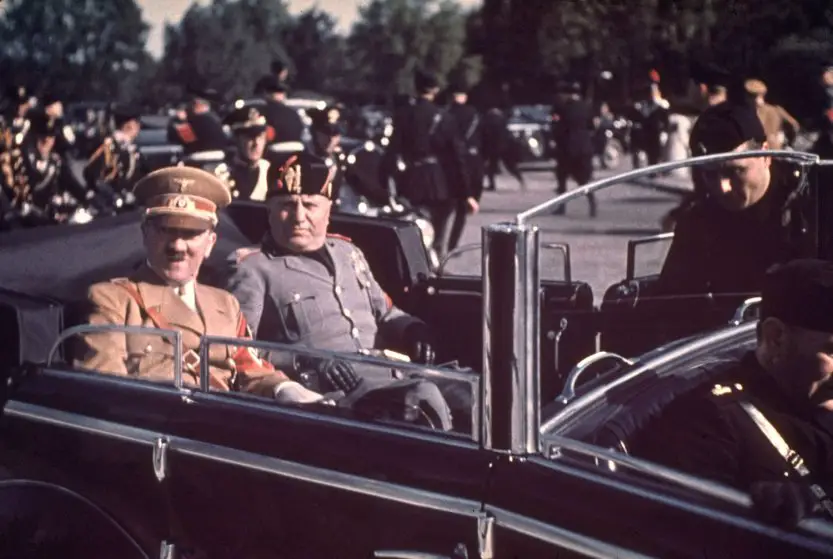
Adolf Hitler visits Benito Mussolini in Italy.
Also, part of his real aim had been to drag Italy into an alliance or, in other words, into the future German orbit that Hitler envisioned would dominate Europe. His task was not very difficult, mainly because Mussolini and successively Galeazzo Ciano, seemed to want nothing more than to emulate the Germans. For the same matter of prestige, Italy intervened in Spain during its Civil War (36-39), in which involvement inflicted on to Italy human, material and monetary losses while achieving no real gain. During this time, while the Axis strengthened to Germany’s advantage, Italy lost a good deal of its political importance in Europe.
The first indication of the German’s real intentions was their occupation of Austria in 1938; even in that case, however, Mussolini and Galeazzo Ciano misread the situation. The Reich’s flag waving in the Brenner Pass somewhat terrorized the Italian people, and Mussolini himself was angry for not being informed in advance of the occupation. Mussolini’s anger with Hitler would not last long though, after the usual reassurances of unity from Hitler, he returned to the position of a staunch ally of Germany.
The event that would lead to the start of Il Duce’s awakening to Hitler’s true intentions came in 1939, when Germany occupied Czechoslovakia, once again without informing Mussolini before acting. At that point, both Mussolini and Ciano began to slowly understand Germany was acting on its own without regard for Italy. It was not going to be an equal partnership.
Ciano’s diary shows the failure of Italian foreign policy. In those days, both Mussolini and Ciano were deeply confused in what path Italy should follow as far as her allegiance to Germany and its Fuhrer were concerned. On the one hand, Mussolini spoke about German betrayal and even considered the possibility of leaving the Axis to become allied with the Anglo-French. What weighed heavily on his mind was the response and perception, in Germany and the world, in taking this course. These sentiments became illustrated in the following two quotes from Mussolini:
“We can not change our policy because we are not bitches.”
Also, of his fears, if he were to break from the Axis:
“Abandoning the Axis means that we are the next victim of Germany.”
To this end, the only Italian reaction to the occupation of Czechoslovakia was the Italians own occupation of Albania, done so to limit German influence in the Balkans. So, once again, Hitler, promising the preservation of Italian interests, was able to convince Mussolini to continue the policy of Axis unity.
What was now becoming clearer was the Italian inability to foresee the next German move. Pointedly in July 1939, the Italian ambassador in Berlin, Attolico, telegraphed several times back to Rome, stating the Germans were preparing to invade Poland. This information was dismissed out of hand by the Italians; Ciano retained that the Ambassador was in the throes of a nervous breakdown, and duly ignored the reports.
But in mid-August, German Foreign Minister Joachim von Ribbentrop informed Ciano that Germany would attack Poland within a few days, with or without the consent of Mussolini. The Italian Minister understood the Italian alignment with Germany had been a big mistake. What followed for the Italians was utter confusion on what to do next.
Ciano, who until then had been decidedly pro-German, now became a bitter enemy of the Nazi party. Dismayed at what was transpiring throughout Europe, Italian King Vittorio Emanuele III said openly that the Germans were “crooks and beggars. “Mussolini, neared a mental break down as he watched his sworn ally launch an invasion into Poland that would officially instigate the most cataclysmic conflict of all time. He swayed day to day between blind loyalty to Hitler and jettisoning the agreement for an alliance with the Anglo-French block.
The result from this indecision was that Mussolini pacified Hitler by telling him Italy would participate in the war alongside the Germans as soon as the army was ready’. At the same time, he secretly told Ciano, “Go to war? I will do as Bertoldo, who was condemned to hang, but with the clause that he could choose the tree at which being hanged. He never found the right tree.” Il Duce was attempting to buy as much time as he could before being forced to make a decision one way or the other on Italian intentions.
Mussolini’s contradictory policy produced several paradoxical situations. He ordered the fortification of the Italian positions in the Alps, especially along the border with Austria. But at the same time, he spent a great deal of manpower, money, iron, and cement in the construction works for the European Exposition of Rome in 1942. This was done over the protest of several of his military commanders. Likewise, Mussolini ordered a general mobilization, yet at the same time, sold a large quantity of leather for shoes to the French army.
With this newly adopted strategy, Italy seemed destined to remain an observer and never join the war. That was to change in the spring of 1940 when Hitler ordered his Wehrmacht to cross the border into France. After Germany invaded France and the Low Countries, again without informing Italy beforehand, Mussolini made a somewhat hopeful claim that: “France is not Poland. The Germans will notice it soon. There will be a new Marne, and the French will shatter the Germans.”
But when Mussolini saw that the Germans were advancing rapidly across the French countryside, he fell once again into a gloomier uncertainty full of self-doubt on a course of action. On the one hand, Mussolini began to think that it was necessary to enter the war soon to share in the imminent German victory. On the other hand, he was angry with the French for not putting up an opposition that might temper or even halt Hitler’s ambitions. He said of the French:
“What are those idiots doing? Why do they not fight?”
His difficulty in understanding the German advance in France was perhaps another demonstration that, by 1940, the Duce had lost the better of his political insight. Too many years spent as an absolute dictator with no one in a position to contradicted or challenge him had made Mussolini a slave to his own glorified myth, and prisoner of his schemes. His capacity to understand and rate other men, nations, and the events that were now gripping the world was severely reduced. So, in Mussolini’s eyes, the shocking developments in France were justified with the conclusion that there was, in fact, a secret accord between France and Germany. Elements of the French government and or military secretly agreed to ‘step aside’ for the German military, thus ushering a new Nazi regime to gain control of the country.
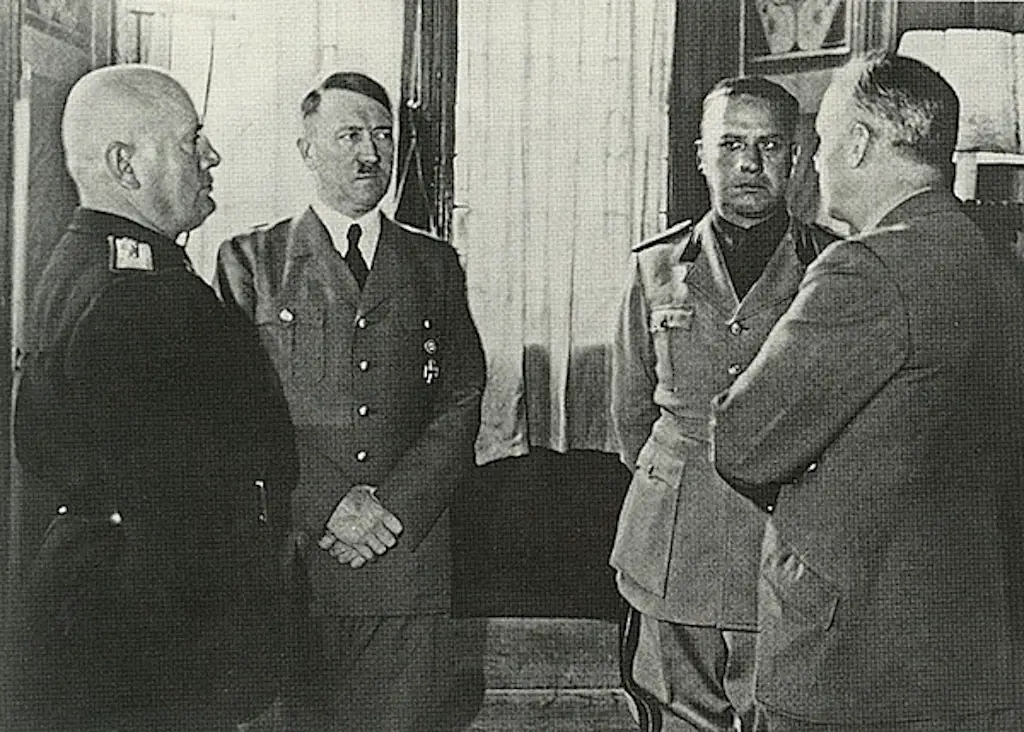
Meeting between Mussolini, Hitler, Ciano and Von Ribbentrop.
Without discarding this option entirely, some past events lend themselves to give some bit of credence to this theory. Years before the actual German invasion, Hitler started to prepare in France the groundwork for Nazism to take hold. He took control of some small, but influential newspapers. After acquiring them, he began to spread Nazi ideology through the power of the ‘press.’ Some of these principles took a great hold onto many right-wing leaning intellectuals, perhaps even more so than in Italy. Maybe because Italians believed Nazism looked like a bad copy of Fascism. While in France, it was considered a revolutionary way to react to an ineffective democracy.
But the real “coup de theatre” was the Russian – German non-aggression pact signed in 1939. At that point, the French leftwing intellectuals were now totally disoriented, being that socialism seemed to be the glue that joined Russia and Germany. They began to see a possible German invasion of France under a different light. A view in which Hitler would annihilate the ‘failed’ capitalist democracy and impose a new socialist order in France.
Thus there was a moment in time in which the extremes of both the French left and right wings, for different reasons, looked positively at the German invasion. The rapid French defeat, in conjunction with the expedient formation of the collaborationist government, suggests a sector of the French establishment (and even a part of the Army) was perhaps not so rigidly opposed to the German invasion and conquest.
The speed at which France fell to Hitler’s army was not even considered beforehand by the Duce. The Duce expected day after day that “a new Marne” would appear to entangle and punish Hitler’s army in a bloody drawn-out affair. It never to materialize on the battlefields of 1940 France.
The following facts are known: 10 June 1940, Italy entered the war alongside Germany, and within days her troops were engaged against the enemy. The Italian advance into France launched at the heart of the French Alps defensive network, was a hastily and poorly planned engagement. It seemed to indicate that little to no planning had been involved. Given almost no artillery support, the Italian soldiers impaled themselves continually onto the French fortifications. Thus a minimal ground was gained in exchange for a costly price in Italian blood.
A theory persists that this was done to secure this mountainous region of the Alps for the eventuality that Hitler would next turn his army south and send troops to war against Italy.
Perhaps most disconcerting about the Italian entry into the war is that the momentous decision to destine the country to the inevitable horrors and hardships to come was not even fully committed until just a handful of days beforehand. Now Italy was thrust into the beginning of the greatest fight ever to befall mankind. And it did so without genuinely knowing who her friends were, and of perhaps greater importance, knowing her real enemies.
With irrefutable certainty, one can state that Italy was unprepared for this war, in both the moral point of view and the practical one. Mussolini and his government had established a new policy for the country to follow into conflict: the policy of uncertainty.
Mussolini’s Blunted Sword
A significant question that has persisted since Fascist Italy’s collapse has been to what extent did the military establishment facilitate and or support the Duce in his actions. Specifically those of a strategic military nature? This question has been debated for a long time and has created a scission in the public opinion of Italians who have formed two opposing beliefs.
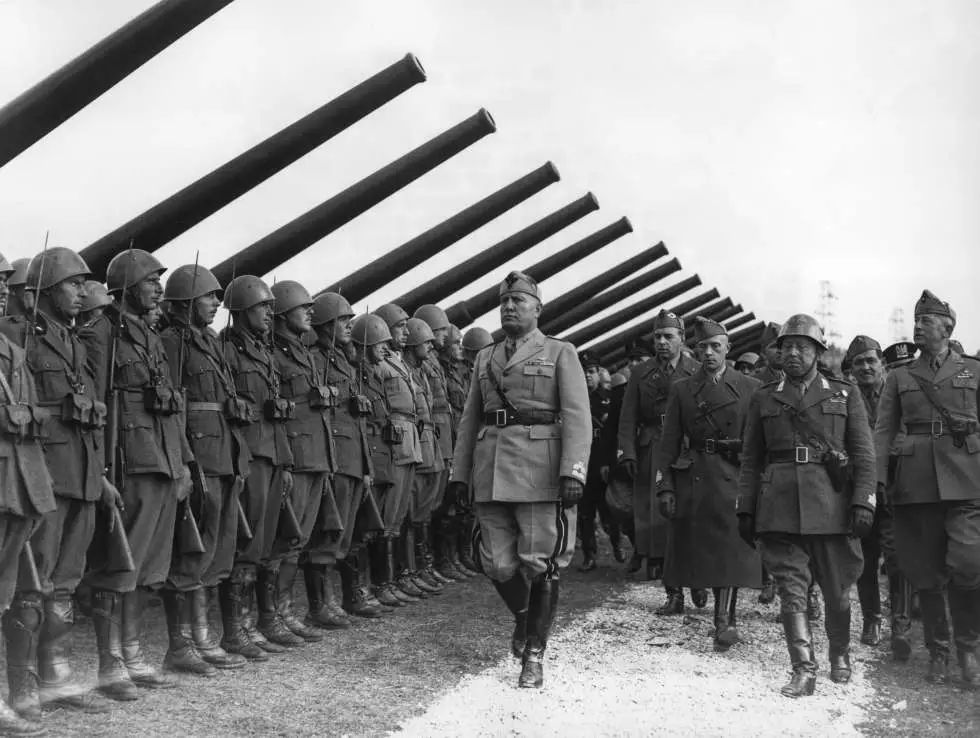
Mussolini reviewing troops.
While one sect has absolved the Army High Command on the belief they were forced to accept any decision which came from a political establishment; the other affirmed the exact opposite. They postulated that Mussolini made far-reaching decisions. Decisions that have been judged by many as irrational or uneducated. Because he was for so long deceived by his Generals, who stated Italy had a powerful army able to endure a long war. Thus to this faction, the blame should be placed on the Duce, who entrusted too much faith in his Generals.
For the Italian ruling class, passing the buck from one to another was the only way to explain Italy’s role and performance in the Second World War. When finally the records of history were made known to the public, knowledge of the truth which emerged did nothing to absolve either side of responsibility. Individuals once labeled guilty or hailed as heroes, were likewise sucked into a whirlwind, which clearly showed that both political and military powers shared in the responsibility, even if in different proportions, in the events which overtook Italy during the war.
Give to Caesar what is Caesar’s……..
The Relationship Between Political Power and Military Establishment
A common mistake when one attempts to analyze military history is the proclivity to ignore or underestimate the balance of power between military status and civilian concerns coexisting together in a nation at war. At first glance, war seems a purely military matter. But nothing is further from the truth than this concept; the armed forces of a nation is nothing more than a tool to accomplish the national strategy (or supreme interest) established by its government.
For this reason, the capacity for clear communication and synergy between any armed force and the central government is of crucial importance for a modern and efficient nation, especially one who is at war. In understanding the Italian armed force’s relationship with the government, it is necessary to begin looking in 1925. It was when Fascism was in a developmental phase still far from the totalitarian dictatorship which it evolved into some years later.
In that year, the minister of war, Antonino Di Giorgio, who was a former General in the First World War, and although not a Fascist, was connected to a coalition which supported the Fascist party, presented to the parliament a draft of laws to modernize the Italian Armed Forces.
His draft, which was ahead of its time in Italian military thinking, also provided for the creation of an Interforce High Command. It was to forge new coordination among Army, Navy, and the newly formed Air Force. Its purpose was to keep a constant channel of communication open between the government and the military.
Related: Italian Army and Some Politics
During this same period, several forward-thinking nations felt the need to begin transforming their supreme commands into a structure that better fit the new concepts of modern warfare. No longer was a nation’s war effort to be directed from a faraway battlefield by its preeminent general but coordinated from a central location able to better process information and, in theory, see clearer through the fog of war. In Italy, however, the development of this conceptualization commenced in a different way due in large part to the persistent and bitter rivalry between the leaders of its armed forces. This led the military hierarchy to view Di Giorgio’s project as a mortal stab to the autonomy of each branch of the military.
While armies of several nations obtained an intertwined and centralized command within their national order, Italian military branches remained strictly separated between each armed forces.
Seeing the intense protests which the military waged against Di Giorgio and his plan, Mussolini immediately understood the political importance that the situation offered him. Since 1922, Mussolini perfectly understood that the armed forces were, in fact, the only Italian institution which had the means or potential to stop the course and growth of Fascism. Thus, Il Duce believed that a compact and united armed force was potentially more dangerous to his movement than three separate armed forces. That is, each was working towards their own goals and ends.
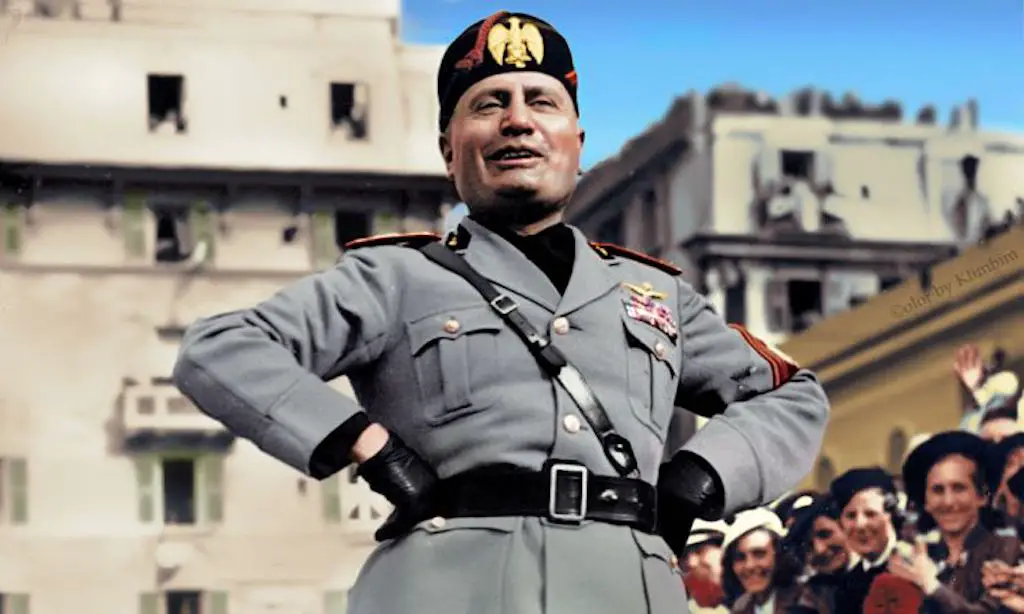
Although Di Giorgio was a minister in Mussolini’s government, the Duce met with the three armed forces chiefs, secretly and one by one, to propose the idea of firing Di Giorgio. He opined termination would maintain, or even improve, the autonomy of the Italian armed forces. In return, he demanded the end of any military interference in the political sphere, a sphere he was well on the way to forging into a dictatorship. The military heads gladly accepted Mussolini’s proposal, setting the precedent in which Fascism dealt with the military power: autonomy in exchange of consensus.
After the war, many Generals asserted that this “strange pact” was an extreme attempt to save the armed forces from the domination of the dictatorship. These claims, however, were just more attempts at deflecting blame. In actuality, the Italian armed forces connived with Fascism as a means to strengthen their private interest. To maintain the command of their individual forces, these leaders swapped their dignity for autonomy, which was only imaginary. If, on the one hand, they gained the sovereignty of management as they all wished, in the long term, they lost any freedom or power to influence the course of the nation.
In any case, the most severe consequence of this agreement was that at this critical juncture in the world’s move to military modernity, Italy, in effect, renounced this crucial step to preserve the interests of both the political and military elite. Their newly established self-serving pact was created at the expense of the nation.
Immediately after firing Minister Di Giorgio, Mussolini proclaimed himself the new Minister of War “ad interim.” He created a new position in the Army, ornately named “The General Chief of Staff,” which had the same function that Di Giorgio projected for his “Inerforce Commander.” The difference was substantial since the “General Chief of Staff” had no real powers except in a consultative function. Thus he was just a figurehead, a sort of liaison officer dispatched into the government hall with an honorary title of being the Higher Commander of the Armed Forces.
The first appointment for this role was Marshall Pietro Badoglio, who maintained that position for over 15 years. He quickly settled into a small office in Rome to begin his ‘duty’ with only a couple of Generals as adjutants. This position and its lack of actual responsibility were genuinely so irrelevant that during those 15 years, Badoglio found the time also to be the Governor of Libya and the commander of the war in Ethiopia.
Badoglio admitted the lack of relevance in his position just before he accepted the role of Libya’s Governor:
“If my job is just to countersign the war plans, my daily presence in Rome isn’t necessary, I can do it very well from Tripoli, by mail.”
Due to their apparent political blindness and naivety, the military branches did not notice that the pact became unbalanced in favor of Mussolini. He became the center of political power, while the branch chiefs became divided into three “sub secretaries.” The higher general of each branch was named that way in deference to the “supreme” role of Badoglio. This role left them perpetually in conflict with each other.
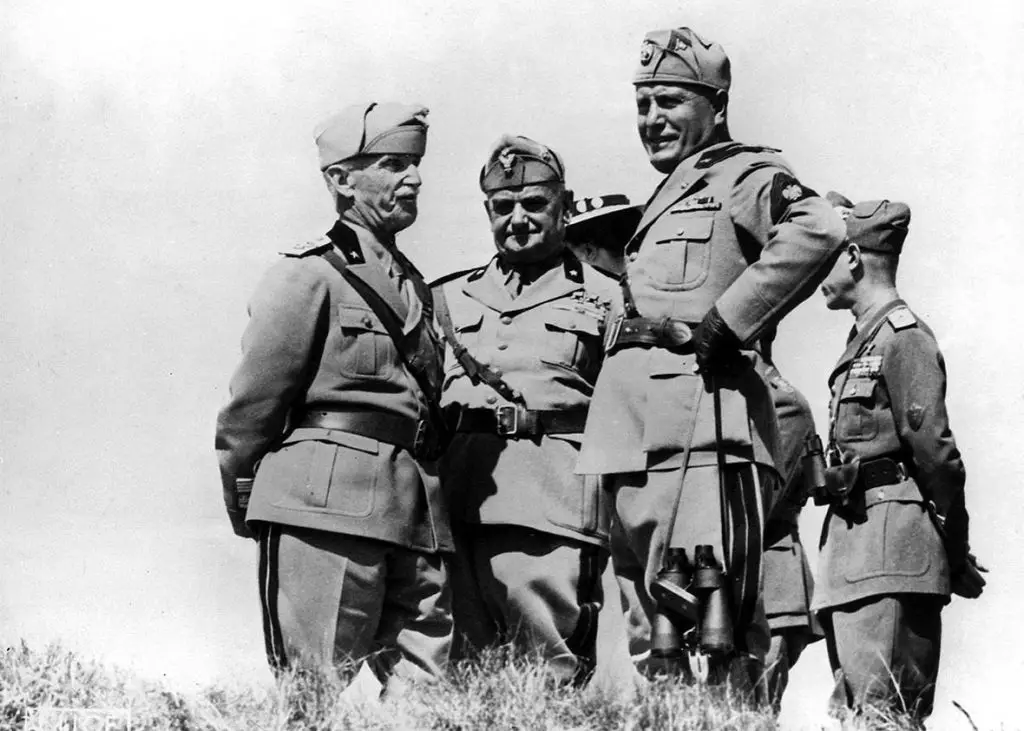
Mussolini and his generals.
So year after year, Mussolini was able to use the rivalry of the sub-secretaries to transfer the more significant part of the nation’s strategic and tactical powers from the military sphere to the political one. With the armed forces under his control, he became the “de facto” chief of the military without Badoglio’s protest. Badoglio, as usual, was more interested in his career than the military institutions he should have been representing.
The direct consequence of this passage of powers was that the sub-secretaries of the armed forces were deprived of significant decisional power and maintained only an administrative autonomy. Metaphorically speaking, Mussolini closed the sub-secretaries of the armed forces into the ‘cages’ of their limited competences where they could do what they wished. But it proved impossible for them, or their authoritative reach, to escape from that ‘cage.’ The direction of the war for Italy was to be controlled almost exclusively by one man, the Duce of Fascism, Benito Mussolini.
By most, this situation is probably thought almost universal in an absolute dictatorship; but in Italy, it took on a connotation that made it even more pronounced and unique when compared to the war management of the countries of Mussolini’s contemporaries, Adolf Hitler and Joseph Stalin. Hitler, at least through the opening years of the war, consulted with his Army High Command on strategies and plans to some degree. Stalin, for his part, counted on the advice of a select few generals, namely Georgy Zhukov, to help set his overall war strategy.
Mussolini, however, did not surround himself with Generals who would or could explain to him military matters. He would sometimes consult with his Generals, but the final decision always rested with him. Mussolini always considered himself to be a great military strategist, and his conviction was heavily reinforced after the victory in Ethiopia. It was a victory he claimed was obtained mostly due to his skill and planning.
Day after day, the word of the Duce became even more incontestable by the sub-secretaries whose positions were weakened by the successful result of this ‘Mussolini led’ campaign.
As time went on, his dictatorial military power created an atmosphere of irresponsibility from the military branches. In a land where the leader claims all decisional control, the subordinates do not feel inclined to make decisions on their own. To this end, many military leaders adopted the mindset that it was better to say or advocate nothing just to avoid the risk of angering the leader and jeopardize one’s career. A lethargic culture of ‘maintaining the status quo’ had set in.
Following the example of Badoglio, a “professional climber,” the sub-secretaries and the high ranking Generals began to act like dark functionaries, concerned only in pleasing the Duce by confirming he was always right on his decisions. This was done with the hope that this could be beneficial for the advancement of their careers. Instead of having a staff of advisors offering dissenting opinions and honest evaluations or appraisals, Mussolini was surrounded by ‘yes men’ and lackeys mainly intent on self-promotion and personal gain.
Mussolini is Always Right
The motto “Mussolini is always right,” which originated during the first wave of Fascism as a sarcastic joke, began to appear as signs on walls throughout the country deprived of any sarcastic sense. It now adopted a new and far-reaching meaning; the ruling class of a nation discharged its responsibility quite willingly to “the man who decided.” Mussolini’s grasp on the nation was a powerful one. Still today, it’s possible to find Army reports from that period detailing military meetings which, after having decided nothing, ended with the sentence “For any other thing we entrust to the supreme genius of the Duce.”
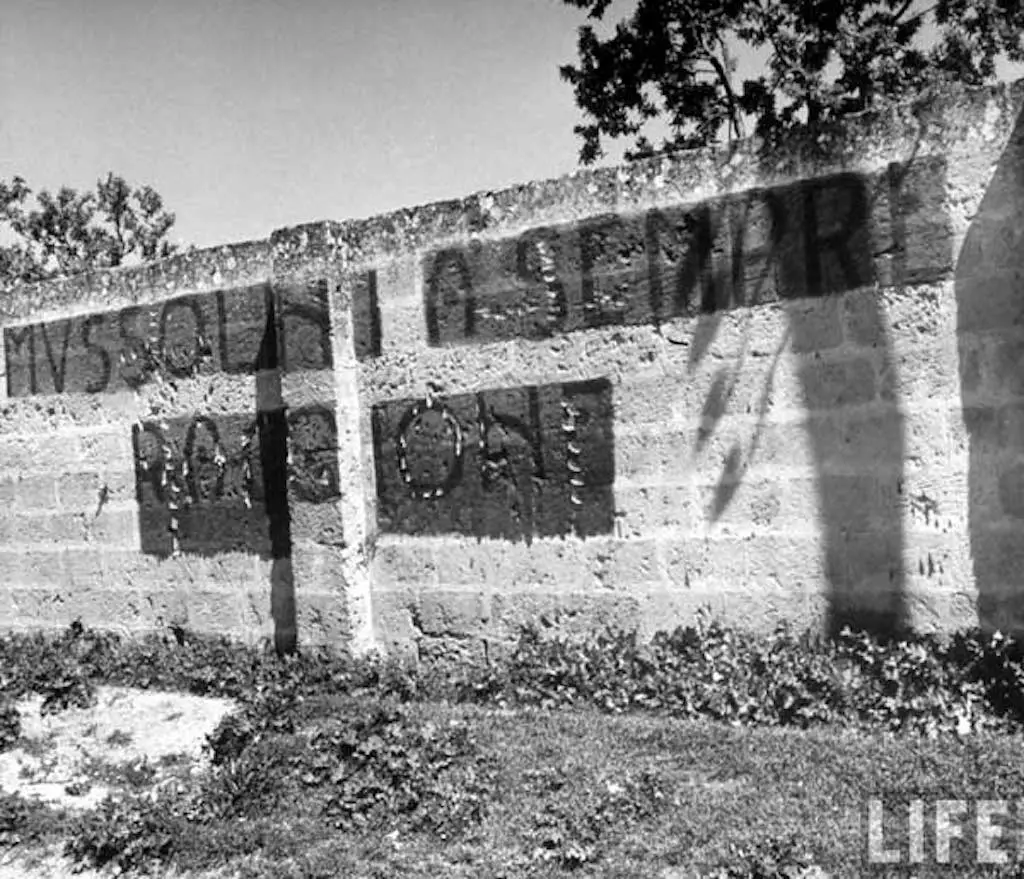
Life image of saying “Mussolini ha sempre ragione (Mussolini is always right).”
At first glance, these could be considered words of fanatic Fascist Generals who would support their Duce to the end. But actually, this was the voice of an irresponsible and menial class of commanders. One could deduce the real meaning of these words as “Duce, do as you wish. We will support you, but remember that every consequence of your choices will fall back only over you”.
Some have tried to explain the strange behavior by theorizing that the generals believed Mussolini possessed only rudimentary knowledge of military affairs. Thus inwardly, they never accepted the Duce in the role of the supreme commander he had attributed to himself. By failing to dissent on matters, the generals gave free rein to Mussolini, perfectly knowing that sooner or later, the Duce would have been hanged by his own hands.
Fully accepting this theory would dismiss the military hierarchy of any guilt in trading the fate of an independent armed force with their self-serving interest. They saved their positions at the expense of thousands of soldiers blindly sent to the massacre.
“…. the tradition of the Italian army is to live outside the politics; faithful instrument in the hands of the civil power.”
The Ant which Turned into a Grasshopper: The Economic Factor
When examining the circumstances of a nation in war, an important factor to note is the financial situation of the country. The real link of conjunction between the civilian contingent of a nation and its military establishment is the amount of money that the political administration can assign to the war effort. It can be said that before the ‘general’ and even before the ‘statesman,’ the one person who could foresee the course of a future war is the ‘economist.’ Any military action in either peacetime or wartime requires proper funding to support its effort. Thus the economic situation of a nation will have a direct correlation on the ability to arm and train its military force properly. The country’s financial footing can be the best ally or the worst enemy of its army.
In 1940, could Italy afford to go to war? The answer is not overtly obvious, and to be answered fully requires a step back of at least 15 years. A common misunderstanding that needs to be clarified is the real economic condition of Italy after the First World War. Italy of those years was a country divided into zones by economic and industrial progress, which alternated more prosperous industrialized areas with poor rural zones. Even as that situation improved in the Thirties, during the whole course of Fascist Italy never reached the role of “superpower,” which Fascist propaganda had self-attributed to the country.
A more accurate description of Italy’s standing in the world between 1920 and 1940 could be termed as a “middle-class power,” nothing more. This reality must be kept in mind for analysis of the Italian Army, for the economic factors facing the country greatly contributed to the failed modernization of its armed forces during those crucial years between the rise of Fascism and the dawn of the Second World War.
In the early 20s, the Italian Army’s worldwide reputation was in good standing, and it was considered as modern an army as there was. The “Army of the Victory” had a huge WWI surplus of uniforms, guns, and ammunition, and its artillery was in substantially good shape both in number and the average age of the pieces. Believing just as most European countries did, they were now facing a long period of peace, and the Army administration organized a gradual reduction of equipment to adapt to a peacetime role. However, the arrival of the new decade revealed that the fire of war was smoldering just beneath the ashes of the past apocalypse, for new political conflicts were overshadowing the growing European homogeneity. The belief that a new war would explode within the next 10-15 years became increasingly plausible.
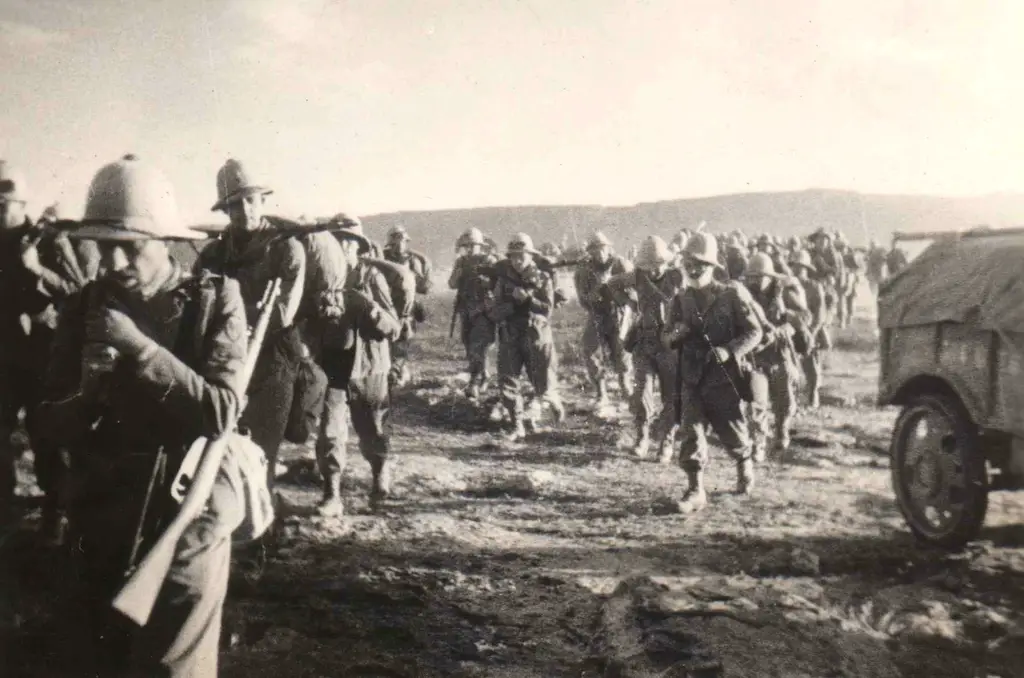
Italian troops during the invasion of Ethiopia. They were in better shape than the Italian military of 1940.
Reacting to the changing prospects of war and peace in the early thirties, the Army High Command halted equipment reduction and created a system of “Intangible War Reserves” which kept a determined amount of military supplies and weapons ready in case the government was forced to decree a state of general mobilization. The Army High command designated a part of its annual budget to achieve a gradual modernization of the reserves. Development of new equipment order to reach a level of preparedness for a conflict anticipated to commence in the mid-1940s. Assuming that about 20% of the national budget was allocated to defense, the modernization plan implemented by the army could have effectively succeeded, but all of this was called into question when Italy undertook its campaign in Ethiopia.
Mussolini considered the war in Ethiopia as an opportunity to enhance his image in and outside the nation. Thus he planned a powerful military operation to demonstrate that Italy was a first-level military power worthy to sit at the same table as France and Great Britain. To achieve this, the Duce managed military resources without regard for costs or future needs. He assembled a massive expeditionary corps that could have been accomplished by half of the forces involved.
The following excerpt of a letter between Mussolini and General Emilio De Bono is just one of many examples that display this mindset of the Duce approaching the war in Ethiopia:
….Concerning the preparation, you have just to ask: I will send to you more and more than what you can ask.
…..You ask three divisions before the end of October, well I intend to send you ten, I say ten.
The victory in Ethiopia meant the proclamation of the ‘Italian Empire.’ The Duce’s prestige and popularity raised to an incredible level; if judged solely on a political point of view, that operation was perhaps the most significant success of Mussolini’s career. However, on the economic side, it was a disaster of significant proportions for Italian finances.
Regardless of the victorious military result, the war in Ethiopia revealed itself to be an economic chasm that ate the equivalent of 1.5 years of the whole national budget. Furthermore, when the propaganda’s trumpets were silent, the crude reality showed that the Italian Empire included a vast territory with no infrastructure, and unable to give immediate profits to the conquerors. After the Ethiopian victory, “the Empire” of Italy was surely bigger, but also less financially secure as before.
Facing a postwar with these economic difficulties, the National Defense found its share of the annual budget now lower or at least equal to levels from the early 30s. The biggest hindrance, however, was that a significant part of the Intangible Reserves was drained during this colonial war. Thus the Army was forced to eliminate or reduce funding and testing modern weaponry. The priority now became the reconstruction of a sufficient quantity of essential supplies and weapons for a future European war.
But even during this less than optimal condition, the Italian political power seemed to be once again more interested in its prestige than practicality. Thus soon after the end of the Ethiopian conquest, the Italian Army was sent into a military intervention in Spain. Even if the cost of this deployment was significantly lower than in Ethiopia, it affected the already limited Army budget in what many consider nothing much more than a publicity effort by Mussolini.
Though thanks to Italian support, a Nationalist victory was gained for Franco and his troops. It kept a potential communist threat out of Spain, which would have caused the Axis some difficulty during World War Two. But the cost was high for the Italians as Mussolini once again spent heavily on the war.
Sometimes, Mussolini’s intent led to excesses, which were even noticed by Franco’s troops, who invented this sarcastic slogan after the defeat at Guadalajara:
“Italianos: Meno camiones y mas cojones!”
(Italians, you need less trucks and more balls!)
If the soldiers of Spain had known the real condition of the Italian Army, they probably would have had a different perception of the Italian participation. Seen from the outside, however, the Italian Army gave the impression to be a mighty organization. Mussolini’s gambit was likewise able to convince several branches of foreign intelligence that Italy had implemented a massive plan of mechanization of its army.
Of course, this was not so. In less than three years, first in Ethiopia and then in Spain, the army “burned” through a significant part of its potential in these almost fruitless demonstrations of force. In the meantime, the situation in Europe, which was getting worse day after day, required a quick and massive preparation of a modern army able to face an imminent conflict. An army that Italy no longer maintained.
The hard reality was that Italy hadn’t enough money either to modernize the army or to provide the bulk of essential equipment for the influx of soldiers needed in case of a general mobilization. It was now forced upon the army’s mid and low commands to pay the price for years of extravagance and ill planning. They would be ordered to manage the available resources to fit any need as best as they could. In other words, a large segment of Italian soldiers fighting in WWII never obtained the critical equipment they needed through the whole of the conflict.
From an economic point of view, the decade between 1930 and 1940 could be defined as the beginning of the downward spiral for the Italian Army, a force that had begun the decade as being considered a modern outfit but reached the dawn of WWII in an unhewn condition of backwardness. Alas, wherein a total of 73 (binary type) divisions, approximately 40 of them did not possess a decent quantity of the most common equipment like shoes, uniforms, and rifles, let alone the necessary amount of armor and transport needed to win a modern war.
This was the condition of the Italian Army in 1940. From a strategic point of view, it remained similar in being to it’s make up from the late twenties. Due to the incurred expenses from forays into Ethiopia and Spain, the government and its army squandered a chance for modernization. From a tactical point of view, the situation in 1940 was far worse than in the early thirties. Mainly because a significant part of the weaponry was now outdated and, on average, of more inferior quality than the soldiers possessed during the previous decade.
A good portion of the soldier’s training continued to focus on the type of warfare that many Italian military planners foresaw as the most likely scenario for its troops. A defensive battle in the mountainous regions of northern Italy, pitted against either French-Yugoslavian forces or Germany, with counterattacks launched after the invaders had worn themselves down on the Italian positions. Although Italian leaders spoke of fighting a ‘rapid’ style of war, similar to the German Blitzkrieg tactics, they never put the amount of training needed to hone this difficult skill.
The years of training for mountain fighting was evident throughout the Second World War for the Italian soldier. Some of their finest performances came in a defensive role in either highland or static positions; Keren and El Alamein, to name a few. But when the most modern of weapons were needed to fight wide-open offensive engagements, Italian units often struggled due in large part to their lack of access to these instruments of war.
There were many in the Comando Supremo in the late 1930s who were very aware that the Italian army would not be ready for some year’s time. In agreeing to an alliance with Germany in 1939 through the ‘Pact of Steel,’ Mussolini was given assurance by Hitler that the Germans had no intention of waging war for several years to come, and the Italians would thus have this opportunity to develop the type of army necessary to win modern wars.
If they would have properly utilized this chance, we will never know, for Hitler’s promise was, of course, a bald-faced lie, and his Wehrmacht unleashed hell upon Poland less than six months after signing the ‘Pact.’ When Mussolini failed to break the chain that bound Italy to Germany, the Italian military was now operating on Hitler’s schedule, and the crisis the limited amount of time Italy had to prepare for war was compounded by its financial and industrial limitations.
So this was the path that had been chosen for the Italian army. A path paved in institutionalized neglect, helmed by a national leader who had once stood at the pinnacle of international statesmanship, but now found himself hopelessly floundering in a sea of despair that was a part of his own making.
Mussolini had been the Duce of a ‘new Italy’ at the dawn of the War. But within four years, he would become swallowed by the immensity of the events. This war was a call to destiny for some men. For example, Winston Churchill, who heeded the call of greatness to guide his country to victory, others faded into the shadows. During the last months of the war, Mussolini had become nothing more than a spectator to history.
Mussolini commanded an army of brave men; brave, but for the most part, uninterested in his dreams of conquest. Men who were asked to fight alongside a partner that they shared no love for, against an enemy that most had no hatred for. He commanded men who were armed for the most part with only the barest of weapons and supplies, led by officers who had grown fat at the teat of corruption or incompetence during the inter-war years.
The Army of Italy would fight on battlefields across the globe, in places, many likely never heard of before. There would be victories obtained, but far more often defeat. There were periods were the army disappointed, and there were those periods that they overachieved. In the end, however, lay ultimate defeat. It may also be said that these defeats did not necessarily originate with the opening of any given engagement, but that the seeds of these losses were sown years before, from behind the desks of bureaucrats, and powerful offices. The war for Italy was not lost in the sands of North Africa, the hills of Greece, or the snow of the Russian steppe; it occurred when its Duce lost his way in the middle of Rome.
Special Thanks to TJ for the overall editing of the text and for his valuable additions. His contributions make him a co-author in all respects.
References
Galeazzo Ciano; Diary 1937 – 1943
Giuseppe Bottai; Diary 1935 – 1944
Giuseppe Bottai; Vent’Anni e un Giorno
Dino Grandi; Il Mio Paese. Ricordi Autobiografici.
Renzo De Felice; Mussolini il Duce vol. 1 and 2
Enzo Biagi; La Seconda Guerra Mondiale – Parlano I Protagonisti